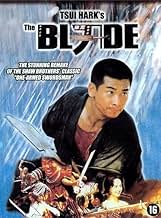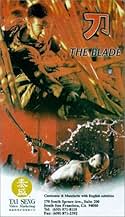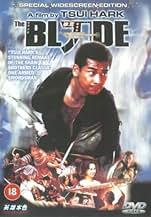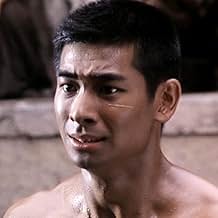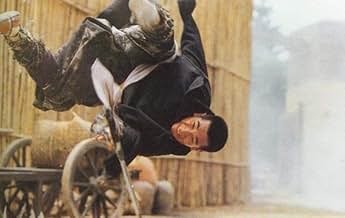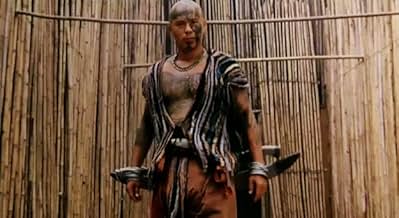Dao
- 1995
- 1 घं 45 मि
IMDb रेटिंग
6.9/10
3.8 हज़ार
आपकी रेटिंग
अपनी भाषा में प्लॉट जोड़ेंA swordsmith trains his friend's orphaned son. The boy seeks revenge for his father's murder but loses an arm rescuing the swordsmith's daughter. A hermit girl nurses him, and he learns swor... सभी पढ़ेंA swordsmith trains his friend's orphaned son. The boy seeks revenge for his father's murder but loses an arm rescuing the swordsmith's daughter. A hermit girl nurses him, and he learns swordsmanship with his father's broken sword.A swordsmith trains his friend's orphaned son. The boy seeks revenge for his father's murder but loses an arm rescuing the swordsmith's daughter. A hermit girl nurses him, and he learns swordsmanship with his father's broken sword.
- पुरस्कार
- 1 जीत और कुल 2 नामांकन
Xiong Xinxin
- Fei Lung
- (as Xin Xin Xiong)
Collin Chou
- Fast Sabre (Guest star)
- (as Sing Ngai)
फ़ीचर्ड समीक्षाएं
It's a shame that a wonderful movie such as THE BLADE received so little coverage/attention from the masses. The only time I have heard about it was from a renounced film critic in HK, and he RAVED about it. And he sure was RIGHT! Tsui Hark did an excellent job here. The atmosphere is good, and the characters are real. As for the action, yes, it's a little too fast, but nonetheless beautifully choreographed.
Apparently, this is quite difficult to see in theatres. I managed to, but it is on video. I imagine that on video, the subtitles are as difficult to read as the ones in "A Chinese Ghost Story" (Another Hark title). Many of the fight scenes are, like the other title, shot on a set in near total darkness with some artificial light as "moonlight". Again, on a screen, beautiful, but on video, a bit hard to see. There is A LOT of fighting, chopped arms legs and heads. (What do you expect, with the action centered around a knife/sword factory?) It's so violent that after a while I found myself laughing to relieve the tension. And the spewing blood can be comical. Like many of these movies, even the "good" guys have questionable motives.
I was interested in this because I'd read that Hark stopped production in the middle because of one of the actress's complaints and rewrote it from a woman's perspective. Still, the main female character is whiny, silly and sheltered, little more than a typical HK plot device to get fights going. I found her character very annoying.
Plot: 4 of 10, fight scenes 8 of 10 IF you can see them on a large screen. Subtitles are lousy, but not really necessary.
I was interested in this because I'd read that Hark stopped production in the middle because of one of the actress's complaints and rewrote it from a woman's perspective. Still, the main female character is whiny, silly and sheltered, little more than a typical HK plot device to get fights going. I found her character very annoying.
Plot: 4 of 10, fight scenes 8 of 10 IF you can see them on a large screen. Subtitles are lousy, but not really necessary.
A beautifully filmed story of love and heroism, hate and revenge. The main character leaves in pursuit of his father's murderer, brandishing his broken sword as his weapon. Unfortunately, in his first confrontation with the murderer, a tattooed character that looks like he jumped from the pages of a comic book, our hero is brutally beaten and loses an arm. Forced to live a young boy he trains himself in a one-handed sword technique from a book called The Blade, and sets of in search of revenge again.
Tsui Hark's Dao aka The Blade (Hong Kong, 1995) is an updating of the old one armed swordsman legend that also has been depicted earlier in the history of Hong Kong cinema. Tsui's new vision is something that dropped my jaws now that I watched it for the third time after many years and without remembering almost anything about it. The film turned out to be among the best Hong Kong cinema miracles from the nineties I've seen so far.
Vincent Zhao Wen Zhuo aka Chiu Man Cheuk is Ting On and Moses Chan Ho is Iron Head and they're both very loyal to their master, an old monk who has teched them during their young lives. The film's narrator and lead female is Ling (Song Lei) who is secretly in love with both of the men but is not quite sure which one will be her loved one. Soon a violent murder takes place, a hand gets chopped off and revenge comes to mind, but none of the characters seem to care or think about their emotions but only to go after their insticts which in this case are mostly about violence and getting even. What follows is more or less (usually more) amazing imagery and bits of sword fighting from this unique film maker of East.
The film depicts people without the willing or ability to express their emotions and that's why many of the reviews seem to dislike the film telling the characters are very cold and inhuman. Of course the film would have needed an example among its characters of how a brighter life could be achieved but still the coldness and lack of expressing emotions is not there without its purpose because this is exactly the film's theme. The ending, the imagined happiness, is fortunately there but still I think there should have been more contrast to the characters' inability to be like a feeling human being. This film is pretty pessimistic as it hasn't any happy or "natural" characters at all, but since we know (those who dare to accept these sides in themselves) what kind of a creature human being is, films like this start to make much more sense and force us to look at the mirror. Would you have gone to take revenge if you were in the one armed swordsman's shoes?
The visuals here are quite amazing and this belongs alongside Ringo Lam's Burning Paradise (1994) and Billy Chung's The Assassin (1993) to the Hong Kong's hyper dark martial art films that never are as near as "light" and also humorous as some Once Upon a Time in China (1991) for instance or other box office hits. Hardly any mainstream audience will like films like Dao because they lack almost every possible entertaining or pleasant element that can be found in Hong Kong martial arts films. The film is very dark and haunting especially when the guy has lost his arm and is training in agony in the misty and menacing house with hysterical female (this character is also very bad and should not have been so noisy and really brainless all the time) taking care of him. Again the smoke and darkness is something that I simply cannot mention having found in too many Western films.
The action is so incredible it again makes me wonder how they edit their films like this. The editor in Dao is Kam Ma who has also edited John Woo's A Better Tomorrow films (1986 and 1987) among many others. The action scenes consist of many close ups and unconventional camera movements that create the kind of hysterical impact I can remember from Jackie Chan's Drunken Master 2 (1994) for example. The action goes even further in the final 15 minutes during the big fight when all the main characters finally get to take their mission to the end. This end fight is like the mind blowingly incredible finale in John Woo's A Better Tomorrow 2, choreographed by the great Ching Siu Tung: both of these finales get so over the top and (thus) separated from the rest of the film that it gets even surreal and thus makes the film's own world look even more impressive and striking and hammers the message and images to the viewer's head. The blood sprayed in these both cases is much more than just results of blade cutting flesh as it all depicts things from our main characters and their values much more effectively and graphically (to say the least) than words likely could. The finale in Dao is among the most jaw dropping scenes from any Hong Kong film of all time and once again these makers have shown their talent and capacity. Dao is not only very dark film, it is also very violent and has sudden bursts of very angry gore during the film and of course mostly in the mentioned last fight. Since there are no any real heros, no good characters and not too much sunshine in Dao, it is easy to expect that sadly this kind of film won't appeal to masses but considering that it starts to look even more valuable that films like these get still made despite that fact.
Dao also lacks all the possible stupid bits of dialogue that often can be found in Hong Kong films. The mentioned female in On's new apartment of course excluded. The film has some very effective silent scenes which is pretty rare in Hong Kong films I think. Especially the montage during On's painful training sequence is very effective as well as some of the scenes depicting Iron Head's unwillingness to use violence in the bar filled with drunken men. He just watches and tries to hold his temper and not hurt anyone. Details like these tell much more about the characters than any fastly and badly written unnatural words ever could.
Dao is a stunning experience even with its flaws and if they were corrected and fixed, this film would really be a masterpiece and maybe perfect of its kind. Now it definitely is a masterpiece of its maker, Tsui Hark, and it has the kind of potential and power that keeps on reminding the admirers of Eastern cinema of what makes these films so unique, precious and overwhelming. 8/10
Vincent Zhao Wen Zhuo aka Chiu Man Cheuk is Ting On and Moses Chan Ho is Iron Head and they're both very loyal to their master, an old monk who has teched them during their young lives. The film's narrator and lead female is Ling (Song Lei) who is secretly in love with both of the men but is not quite sure which one will be her loved one. Soon a violent murder takes place, a hand gets chopped off and revenge comes to mind, but none of the characters seem to care or think about their emotions but only to go after their insticts which in this case are mostly about violence and getting even. What follows is more or less (usually more) amazing imagery and bits of sword fighting from this unique film maker of East.
The film depicts people without the willing or ability to express their emotions and that's why many of the reviews seem to dislike the film telling the characters are very cold and inhuman. Of course the film would have needed an example among its characters of how a brighter life could be achieved but still the coldness and lack of expressing emotions is not there without its purpose because this is exactly the film's theme. The ending, the imagined happiness, is fortunately there but still I think there should have been more contrast to the characters' inability to be like a feeling human being. This film is pretty pessimistic as it hasn't any happy or "natural" characters at all, but since we know (those who dare to accept these sides in themselves) what kind of a creature human being is, films like this start to make much more sense and force us to look at the mirror. Would you have gone to take revenge if you were in the one armed swordsman's shoes?
The visuals here are quite amazing and this belongs alongside Ringo Lam's Burning Paradise (1994) and Billy Chung's The Assassin (1993) to the Hong Kong's hyper dark martial art films that never are as near as "light" and also humorous as some Once Upon a Time in China (1991) for instance or other box office hits. Hardly any mainstream audience will like films like Dao because they lack almost every possible entertaining or pleasant element that can be found in Hong Kong martial arts films. The film is very dark and haunting especially when the guy has lost his arm and is training in agony in the misty and menacing house with hysterical female (this character is also very bad and should not have been so noisy and really brainless all the time) taking care of him. Again the smoke and darkness is something that I simply cannot mention having found in too many Western films.
The action is so incredible it again makes me wonder how they edit their films like this. The editor in Dao is Kam Ma who has also edited John Woo's A Better Tomorrow films (1986 and 1987) among many others. The action scenes consist of many close ups and unconventional camera movements that create the kind of hysterical impact I can remember from Jackie Chan's Drunken Master 2 (1994) for example. The action goes even further in the final 15 minutes during the big fight when all the main characters finally get to take their mission to the end. This end fight is like the mind blowingly incredible finale in John Woo's A Better Tomorrow 2, choreographed by the great Ching Siu Tung: both of these finales get so over the top and (thus) separated from the rest of the film that it gets even surreal and thus makes the film's own world look even more impressive and striking and hammers the message and images to the viewer's head. The blood sprayed in these both cases is much more than just results of blade cutting flesh as it all depicts things from our main characters and their values much more effectively and graphically (to say the least) than words likely could. The finale in Dao is among the most jaw dropping scenes from any Hong Kong film of all time and once again these makers have shown their talent and capacity. Dao is not only very dark film, it is also very violent and has sudden bursts of very angry gore during the film and of course mostly in the mentioned last fight. Since there are no any real heros, no good characters and not too much sunshine in Dao, it is easy to expect that sadly this kind of film won't appeal to masses but considering that it starts to look even more valuable that films like these get still made despite that fact.
Dao also lacks all the possible stupid bits of dialogue that often can be found in Hong Kong films. The mentioned female in On's new apartment of course excluded. The film has some very effective silent scenes which is pretty rare in Hong Kong films I think. Especially the montage during On's painful training sequence is very effective as well as some of the scenes depicting Iron Head's unwillingness to use violence in the bar filled with drunken men. He just watches and tries to hold his temper and not hurt anyone. Details like these tell much more about the characters than any fastly and badly written unnatural words ever could.
Dao is a stunning experience even with its flaws and if they were corrected and fixed, this film would really be a masterpiece and maybe perfect of its kind. Now it definitely is a masterpiece of its maker, Tsui Hark, and it has the kind of potential and power that keeps on reminding the admirers of Eastern cinema of what makes these films so unique, precious and overwhelming. 8/10
9zdac
The Blade is a whirlwind of blood, dust, and psychedelic colour. Beneath its rough, brutal appearance lies an uncompromising and technically evolved offering from Hong Kong's prolific director/producer giant Tsui Hark. Based on the old-school kung-fu classic The One-Armed Swordsman, The Blade tells the story of a young man adopted by a renowned blacksmith, who discovers that his true father was killed by superstitiously powerful bandit named Lung, "who it is said can fly!".
When he impulsively goes out seeking revenge, he runs afoul of a gang of desert scum and loses his right arm in the encounter. Ashamed, he goes into hiding but after finding an broken weapon and the tatters of an old swordfighting manual, he begins to come to terms with his self-loathing, and eventually learns to compensate for his loss. With half a sword, half a technique, and still one arm short of a pair, he returns to his old home to confront both his past and the man who murdered his father.
A simple tale of vengeful perseverance here gets a nihilistic gritty art-house treatment. The action takes place in an amoral, almost post-apocalyptic desert landscape. Hark's camera speeds around with abandon, capturing both the bleak setting and the lush expressive palette of the characters' internal emotional landscape. In terms of camera style and visual dynamism, this is Hark's most adventurous film. Although seemingly frantic, it is never random. The cinematography bears a meticulous attention to detail, and the editing has a razor-sharp rhythm of its own.
There's a lot going on under the surface here. The simple story is fleshed out with a dark sensuality. Along with themes of surmounting obstacles through hard work, and misplaced honour in a harsh and selfish world (kung fu movie essentials), we find commentary on lust, gender, and simple pragmatism as well. Early on, a Shaolin monk, icon of heroism, meets a grisly, inglorious end, signifying that this is not just another heroic martial-arts fantasy. And yet heroism survives, in the form of a crippled man with a broken, cleaver-like weapon... just one more way The Blade offers new twists on old conventions.
This being a Hong Kong martial-arts movie, the action is to be noted. Where fluid idealized wushu forms might normally prevail, a certain street-level grittiness and desperation takes hold. Even when characters are performing incredible feats, you find yourself thinking "So this is what kung-fu fighting was really like."
Although Chiu Cheuk and villainous Xiong Xin Xin can certainly deliver spectacular physical displays (as seen in Hark's later Once Upon A Time in China films), in The Blade the camera and editing take the lead. While some reviewers tend to forget the "cinema" part of "martial arts cinema", and complain that much of the action is concealed by the breakneck editing and moving camera, there is still an impressive amount of wushu on display in this film, and the frenzied cutting serves to heighten the excitement and the abilities of the performers, even without implied supernatural powers or gratuitous wire stunts. As a result, the final 15 minutes of this movie frame possibly some of the most furious, breathless, vicious fight sequences in cinema history.
Believe it!
When he impulsively goes out seeking revenge, he runs afoul of a gang of desert scum and loses his right arm in the encounter. Ashamed, he goes into hiding but after finding an broken weapon and the tatters of an old swordfighting manual, he begins to come to terms with his self-loathing, and eventually learns to compensate for his loss. With half a sword, half a technique, and still one arm short of a pair, he returns to his old home to confront both his past and the man who murdered his father.
A simple tale of vengeful perseverance here gets a nihilistic gritty art-house treatment. The action takes place in an amoral, almost post-apocalyptic desert landscape. Hark's camera speeds around with abandon, capturing both the bleak setting and the lush expressive palette of the characters' internal emotional landscape. In terms of camera style and visual dynamism, this is Hark's most adventurous film. Although seemingly frantic, it is never random. The cinematography bears a meticulous attention to detail, and the editing has a razor-sharp rhythm of its own.
There's a lot going on under the surface here. The simple story is fleshed out with a dark sensuality. Along with themes of surmounting obstacles through hard work, and misplaced honour in a harsh and selfish world (kung fu movie essentials), we find commentary on lust, gender, and simple pragmatism as well. Early on, a Shaolin monk, icon of heroism, meets a grisly, inglorious end, signifying that this is not just another heroic martial-arts fantasy. And yet heroism survives, in the form of a crippled man with a broken, cleaver-like weapon... just one more way The Blade offers new twists on old conventions.
This being a Hong Kong martial-arts movie, the action is to be noted. Where fluid idealized wushu forms might normally prevail, a certain street-level grittiness and desperation takes hold. Even when characters are performing incredible feats, you find yourself thinking "So this is what kung-fu fighting was really like."
Although Chiu Cheuk and villainous Xiong Xin Xin can certainly deliver spectacular physical displays (as seen in Hark's later Once Upon A Time in China films), in The Blade the camera and editing take the lead. While some reviewers tend to forget the "cinema" part of "martial arts cinema", and complain that much of the action is concealed by the breakneck editing and moving camera, there is still an impressive amount of wushu on display in this film, and the frenzied cutting serves to heighten the excitement and the abilities of the performers, even without implied supernatural powers or gratuitous wire stunts. As a result, the final 15 minutes of this movie frame possibly some of the most furious, breathless, vicious fight sequences in cinema history.
Believe it!
क्या आपको पता है
- ट्रिवियाOne of Quentin Tarantino's 20 Favourite Movies from 1992 to 2009.
- गूफ़The tattoos on Fei Lung's chest disappear when Ding On throws the blade at his throat in the finale.
- कनेक्शनFeatured in Video Buck: TOP 13: Las mejores películas de artes marciales (2017)
टॉप पसंद
रेटिंग देने के लिए साइन-इन करें और वैयक्तिकृत सुझावों के लिए वॉचलिस्ट करें
- How long is The Blade?Alexa द्वारा संचालित
विवरण
इस पेज में योगदान दें
किसी बदलाव का सुझाव दें या अनुपलब्ध कॉन्टेंट जोड़ें


